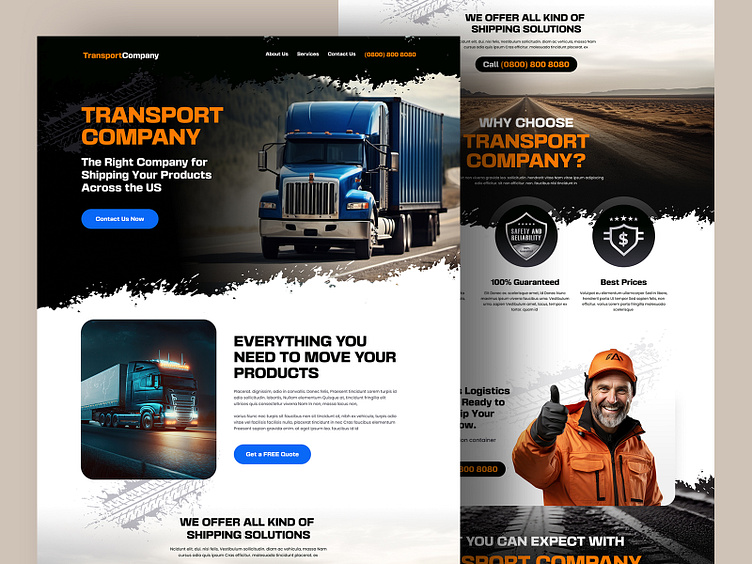Boost Your Brand Name With Tailored Transport Internet Style for Seamless Customer Experience
In today's competitive landscape, the value of a tailored transport web layout can not be overemphasized. A well-crafted web site not just acts as an electronic storefront but additionally plays an important function in shaping user experience and boosting brand name identity. By concentrating on user-friendly navigating and responsive formats, services can ensure that prospective customers involve with their services seamlessly, despite the device made use of. Nonetheless, the journey towards an efficient web existence includes more than just looks; it needs strategic selections that resonate with your target market. What aspects are important in creating a truly impactful on-line experience?
Significance of Custom-made Internet Design
In the affordable landscape of transportation services, standing out is critical, and personalized internet layout plays a crucial function in accomplishing this distinction. A customized web style not only boosts a company's online existence however additionally mirrors its special brand identity, which is vital in bring in and retaining clients - transportation web design. This method enables businesses to create an internet site that efficiently connects their services, values, and objective, establishing them aside from competitors

Furthermore, a well-designed web site can considerably improve search engine visibility, bring in organic website traffic and possible customers. Customization likewise allows for the combination of analytics devices, allowing firms to monitor user behavior and adapt their strategies appropriately. Eventually, buying personalized internet layout is not just regarding looks; it is a calculated decision that enhances brand name acknowledgment, individual engagement, and overall service growth in the transport industry.
Crucial Element of Customer Experience
Individual experience (UX) functions as the foundation of efficient web layout, straight influencing how site visitors communicate with a transport company's site. Numerous crucial elements add to an optimal UX, starting with user-friendly navigating. A well-structured menu enables users to discover information promptly, lessening frustration and improving complete satisfaction.
One more vital facet is packing speed; sites must do successfully to keep customers' attention. A delay of just a few secs can bring about higher bounce rates. In addition, aesthetic power structure plays an important duty, assisting users through material and making sure that the most essential information attracts attention.
Content readability is important, as it affects just how easily individuals can soak up information. Clear typography, suitable typeface dimensions, and sufficient contrast boost readability. Incorporating engaging visuals can improve the individual experience, making the site extra enticing and insightful.
Last but not least, access can not be forgotten. Creating for all users, including those with impairments, makes sure inclusivity and broadens the target market. By concentrating on these essential components of UX, transportation business can develop a website that not just attracts visitors however likewise promotes engagement and commitment.

Advantages of Responsive Layouts
Regularly, services overlook the importance of receptive designs in internet layout, yet they are essential for fitting the varied range of devices users utilize today. A responsive design makes certain that your website adapts flawlessly to numerous screen dimensions, giving an ideal viewing experience throughout smartphones, tablets, and desktops (transportation web design). This adaptability boosts individual interaction, as visitors are most likely to remain on a website that is very easy to browse, regardless of the gadget they use
Furthermore, responsive designs add to enhanced search engine optimization (SEARCH ENGINE OPTIMIZATION) Online search engine like Google prioritize mobile-friendly sites in their rankings, which indicates that adopting a receptive format can cause increased visibility and greater web traffic. Furthermore, preserving a solitary responsive website decreases the requirement for separate mobile versions, streamlining site administration and minimizing maintenance costs.
Another trick benefit is the improvement of brand name reputation. A professional, well-structured web site that does consistently across devices fosters trust amongst customers. Last but not least, responsive designs are future-proof; as new tools arise, your internet site remains versatile, guaranteeing an enduring visibility in an ever-evolving digital landscape. Welcoming receptive formats is essential for any service aiming to elevate its online presence and customer contentment.
Enhancing Brand Name Identity
A strong brand name identification is vital for any type of transport organization wanting to stick out in a competitive marketplace. It acts as the structure whereupon customer perceptions are built, affecting their trust fund and loyalty. transportation web design. A well-designed website can substantially enhance this identification, supplying an aesthetic depiction of the brand's worths, mission, and solutions
To properly convey brand name identification, transport website design should integrate constant elements such as logo designs, color design, and typography. These elements need to resonate with the target market, producing a psychological connection that promotes acknowledgment and recall. Additionally, the images used on the website must reflect the significance of the brand-- whether it's dependability, advancement, or rate.
By integrating these vital design components and narration methods, transportation organizations can craft a natural and compelling on-line existence that not more information just records attention however likewise builds long-term connections with their customers. In doing so, they raise their brand identification, ensuring it remains remarkable in a crowded market.

Techniques for Reliable Navigating
Effective navigating is critical for any type of transportation web site, as it straight affects individual experience and engagement. This enables individuals to locate required details promptly.
Including a search function improves navigation even more, making it possible for individuals to find certain details effectively. In addition, breadcrumb navigating is advantageous as it supplies individuals with context regarding their current location within the site, making it simpler to backtrack if required.
Utilizing a receptive design is also essential, making sure that navigation stays easy to use across tools, from desktop computers to mobile phones. Uniformity in navigation aspects, such as switches and links, promotes experience, which can result in enhanced customer retention.
Last but not least, consider executing a sticky food selection that stays accessible as users scroll down the page. This maintains important navigation options accessible, improving use. By focusing on these techniques, transportation web sites can develop a smooth navigation experience that fosters user involvement and complete satisfaction.
Conclusion

Comments on “Crafting User-Friendly transportation web design for Maximum Impact.”